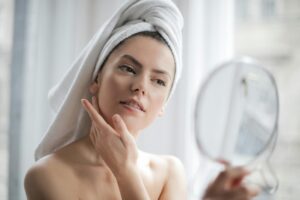Acne, a common skin condition affecting millions worldwide, can be frustrating and challenging to manage. From teenagers to adults, acne can impact self-esteem and confidence. Fortunately, effective treatments exist to help combat acne and achieve clearer, healthier skin. In this article, we’ll explore six easy acne treatment solutions that anyone can incorporate into their skincare routine.
Understanding Acne:
Before diving into treatment options, it’s crucial to understand the underlying causes of acne. Acne typically arises due to factors such as excess oil production, clogged pores, bacteria buildup, hormonal changes, and inflammation. These factors contribute to the formation of pimples, blackheads, whiteheads, and more severe acne lesions.
Gentle Cleansing: One of the simplest yet most effective ways to treat acne is by maintaining a regular cleansing routine. Using a gentle, non-comedogenic cleanser twice daily can help remove dirt, oil, and impurities from the skin’s surface. Avoid harsh scrubbing or overwashing, as this can irritate the skin and exacerbate acne. Look for cleansers containing ingredients like salicylic acid or benzoyl peroxide, known for their acne-fighting properties.
Topical Treatments: Topical acne treatments are readily available over the counter and can be applied directly to affected areas. Ingredients like benzoyl peroxide, salicylic acid, and retinoids work to unclog pores, reduce inflammation, and kill acne-causing bacteria. These treatments come in various forms, including creams, gels, and spot treatments. Start with a lower concentration to prevent irritation, and gradually increase as needed. Consistency is key when using topical treatments, so apply them regularly as part of your skincare routine.
Moisturize: Contrary to popular belief, moisturizing is essential, even for acne-prone skin. Using a lightweight, oil-free moisturizer helps maintain the skin’s hydration levels and prevents it from becoming dry and irritated. Look for non-comedogenic formulas that won’t clog pores or exacerbate acne. Moisturizing also helps create a protective barrier on the skin, which can aid in healing acne lesions and reducing redness and inflammation.
Dietary Changes: While the relationship between diet and acne is complex, making certain dietary changes may help improve skin health and reduce acne flare-ups. Focus on incorporating more fruits, vegetables, lean proteins, and whole grains into your diet while limiting refined sugars, processed foods, and dairy products. Some individuals may find that certain foods, such as dairy or high-glycemic foods, trigger acne breakouts. Pay attention to your body’s response to different foods and adjust your diet accordingly.
Stress Management: Stress can exacerbate acne by triggering hormonal fluctuations and increasing inflammation in the body. Finding healthy ways to manage stress is essential for maintaining clear skin. Incorporate stress-reducing activities into your daily routine, such as exercise, meditation, yoga, or spending time outdoors. Getting an adequate amount of sleep is also crucial for skin health, as lack of sleep can contribute to increased cortisol levels and worsen acne.
Consult a Dermatologist: If over-the-counter treatments and lifestyle changes are not providing relief, it may be time to consult a dermatologist. A dermatologist can assess your skin condition, identify any underlying causes of acne, and recommend personalized treatment options. Prescription medications, such as oral antibiotics, topical retinoids, or hormonal therapies, may be necessary for severe or persistent acne. Additionally, dermatologists can perform procedures like chemical peels, microdermabrasion, or laser therapy to help improve skin texture and reduce acne scars.
Conclusion:
Acne treatment doesn’t have to be complicated or expensive. By incorporating these six easy acne treatment solutions into your skincare routine, you can effectively manage acne and achieve clearer, healthier skin. Remember to be patient and consistent with your treatment approach, as results may take time to appear. If you’re unsure about which treatments are best for your skin, don’t hesitate to seek guidance from a dermatologist. With the right approach, you can overcome acne and feel confident in your skin once again.



